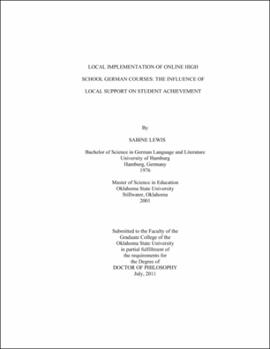| dc.contributor.advisor | Yellin, David | |
| dc.contributor.author | Lewis, Sabine | |
| dc.date.accessioned | 2013-11-26T08:34:40Z | |
| dc.date.available | 2013-11-26T08:34:40Z | |
| dc.date.issued | 2011-07 | |
| dc.identifier.uri | https://hdl.handle.net/11244/7481 | |
| dc.description.abstract | Scope and Method of Study: Descriptive analysis of online German high school courses through surveys for school administrators and local facilitators and through analysis of students' grades. | |
| dc.description.abstract | Findings and Conclusions: Successful implementation of K-12 online courses will largely depend on the availability of data that school officials can use to make informed decisions. However, very little research has been done in this area, and the absence of data forces school officials to make ad-hoc decisions that often have less than satisfactory results. The lack of research is especially regrettable in the area of local student support, because the course instructors for the German Online program had noticed over the last 25 years that this support, especially in the role of the local facilitator, is vital to student success. In order to examine this assumption, the researcher surveyed administrators and facilitators at 174 high schools and middle schools to find how these schools implemented the courses of the German Online high school program. In a second part of the study, students' cumulative final grades for the online courses were examined to find which implementation practices coincided with high student achievement. The researcher found that the grades for all five online German courses with a total of 926 students were not normally distributed, but instead showed a bimodal distribution with peaks at both ends. In other words, there were a lot of As and Fs, but not much in between. The failing grades were mostly due to non-completion of courses rather than poor outcomes for individual tests and assignments. At some schools, all of the students had final grades at the high end of the grade scale ('high-scoring schools'), whereas at other schools, most students had Cs or below ('low-scoring schools'). The researcher compared these two groups with respect to implementation and student support as shown in the survey answers and found that high-scoring schools had full-time facilitators who in most cases had been trained through workshops, had frequent contact with the online instructors and other facilitators, and did not report problems with the technology. Low-scoring schools, on the other hand, had part-time facilitators who had received only some basic or no training, had little or no contact with the course instructors and other facilitators, and reported problems with the technology for which they had to call on outside help. | |
| dc.format | application/pdf | |
| dc.language | en_US | |
| dc.rights | Copyright is held by the author who has granted the Oklahoma State University Library the non-exclusive right to share this material in its institutional repository. Contact Digital Library Services at lib-dls@okstate.edu or 405-744-9161 for the permission policy on the use, reproduction or distribution of this material. | |
| dc.title | Local implementation of online high school German courses: The influence of local support on student achievement | |
| dc.contributor.committeeMember | Ausburn, Lynna | |
| dc.contributor.committeeMember | Antonenko, Pasha | |
| dc.contributor.committeeMember | Tribble, Keith | |
| osu.filename | Lewis_okstate_0664D_11548.pdf | |
| osu.accesstype | Open Access | |
| dc.type.genre | Dissertation | |
| dc.type.material | Text | |
| dc.subject.keywords | foreign language | |
| dc.subject.keywords | high school | |
| dc.subject.keywords | online learning | |
| thesis.degree.discipline | Teaching and Curriculum Leadership | |
| thesis.degree.grantor | Oklahoma State University | |
